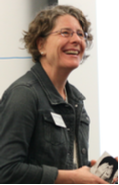Batya Friedman (University of Washington)Â

Title – „Lives and Societies of Quality: A Value Sensitive Design Perspectiveâ€
Abstract – Tools and technologies are fundamental to the human condition. They do no less than create and structure the conditions in which we live, express ourselves, enact society, and experience what it means to be human. They are also the result of human imagination. Yet, with our limited view, it is not at all obvious how to design tools and technology so that they are more likely to support the actions, relationships, institutions, and experiences that human beings care deeply about – a life and society of quality. In this talk I will explore the deep scientific knowledge and technology trends at the cusp of the 21st century. Thinking longer-term and systemically, I will bring forward a range of potential challenges and opportunities in light of these trends. To do so, I will draw from over two decades of theory development and technical design work in Value Sensitive Design. My comments will engage individual lives, society writ large, what it means to be human, the planet and beyond.
Short Bio – Batya Friedman is a professor in the Information School, adjunct professor in the Department of Computer Science, and adjunct professor in the Department of Human-Centered Design and Engineering at the University of Washington where she co-directs the Value Sensitive Design Research Lab and co-directs the UW Tech Policy Lab. Dr. Friedman pioneered value sensitive design (VSD), an approach to account for human values in the design of information systems. First developed in human-computer interaction, VSD has since been used in civil engineering, computer security, human-robotic interaction, information management, land use and transportation, legal theory, and moral philosophy. Her work has focused on a wide range of values, some include privacy in public, trust, freedom from bias, moral agency, sustainability, safety, calmness, freedom of expression, and human dignity; along with a range of technologies such as web browsers, urban simulation, robotics, open source tools, mobile computing, implantable medical devices, social media, ubiquitous computing and computing infrastructure. Dr. Friedman is currently working on multi-lifespan design and on methods for envisioning – imagining new ideas for leveraging information systems to shape our futures. Voices from the Rwanda Tribunal is a first project in this multi-lifespan design research program. In 2012 Batya Friedman received the ACM-SIGCHI Social Impact Award and the University Faculty Lecturer award at the University of Washington. She received both her B.A. and Ph.D. from the University of California at Berkeley.
Background Information – Friedman, B., Hendry, D.G., and Borning, A. (accepted). A Survey of Value Sensitive Design Methods. Foundations and Trends in Human Computer Interaction. Boston and Delft: Now Publishers.
Pelle Ehn (Malmoe University)Â

Title – „Things that matter – beyond Objects and Users“
Abstract – Despite their many merit in contributing to quality of life in a digital age this talk suggests replacing human centred design and user driven innovation projects with engagements in design things understood as long term democratic design experiments. Etymologically this calls for a revitalisation of the Thing, the old Nordic and Germanic assembly dealing with public matters of concern. Epistemologically it transcends the subject-object divide, proposing thinging as a socio-material design practice, a flickering movement between subject and object as well as between object and assembly. Such democratic design experiments in the small and in the many are both concerned with the laboratory practice of designarly making and the parliamentary practice of decision-making. Politics becomes not external to design, but intrinsic to its very making.
Short Bio – Pelle Ehn, is professor emeritus at the School of Arts and Communication, Malmö University, Sweden. He has for more than forty years been involved in the research field of collaborative and participatory design and in bridging design and information technology. Research projects include DEMOS from the seventies on information technology and work place democracy, UTOPIA from the eighties on user participation and skill based design, ATELIER from turn of the century on architecture and technology for creative environments, and during the last decade Malmö Living Labs, an open environment for democratic design experiments. His often collaborative publications include Emancipation and the Design of Information Systems (1974), Computers and Democracy (1987), Work-Oriented Design of Computer Artifacts (1988), Manifesto for a Digital Bauhaus (1998), Design Things (2011), Making Futures (2014) and Democratic Design Experiments (2015).
Background Information – Thomas Binder, Eva Brandt, Pelle Ehn & Joachim Halse (2015) Democratic design experiments: between parliament and laboratory, CoDesign, 11:3-4, 152-165, DOI: 10.1080/15710882.2015.1081248 Link to the Article.
Cindy Hmelo-Silver (Indiana University, Bloomington)

Title – “Computer-supported collaborative learning: Technology to support for learning and lifeâ€
Abstract – Much research and development has focused on developing technology to support collaborative learning in compulsory schooling and formal educational settings. Yet, some of these same technological tools as well as new tools that have not yet been invented can support learning driven by one’s own interests. In particular, it is important to think about how technology can be used to support both learning and collaboration outside of formal schooling, and considering the design trade-offs between just providing information on demand and supporting learning and engagement that help enhance one’s quality of life by addressing what people want to do. Jeong and Hmelo-Silver (2016) identified seven affordances needed for computer-supported collaborative learning. These seven affordances include providing tools for communication, collaborative tasks, structuring the collaborative learning process, facilitating the sharing and creation of resources, supporting knowledge co-construction and intersubjectivity, helping with monitoring and regulation, and forming groups and communities. In my talk, I will consider how these are part of socio-technical system that can support lifelong, interest driven learning and the design tradeoffs that these affordances might entail between structure and agency.
Short Bio – Cindy E. Hmelo-Silver is the Barbara B. Jacobs Chair in Education and Technology, Professor of Learning Sciences and Director of the Center for Research on Learning and Technology at Indiana University. Her research interests focus on technology support for learning about complex phenomena. As part of this work, she studies problem-based learning, collaborative knowledge construction, and computer supported collaborative learning. She is past editor of the Journal of the Learning Sciences, is associate editor of Instructional Science and serves on the editorial board of the International Journal of Computer Supported Collaborative Learning and the advisory board of the Interdisciplinary Journal of Problem-based Learning. She has edited several books and has published widely in the areas of problem-based learning, technology and the learning sciences. She has edited several books including the International Handbook of Collaborative Learning.  Dr. Hmelo-Silver is a past president of the International Society for Learning Sciences.Â
Background Information – Jeong, H. & Hmelo-Silver, C. E. (2016). Seven affordances of CSCL Technology: How can technology support collaborative learning. Educational Psychologist. 51, 247-265.
Alfred Kobsa (University of California, Irvine)Â

Titel – „Design Trade-offs in Personalization versus Privacy“
Abstract – Personalization can be at odds with privacy since personalization necessitates the collection of considerable amounts of personal data. Numerous consumer surveys reveal that computer users value personalization but at the same time are very concerned about their privacy online. We will discuss legal and technical means as well as strategies based on human-computer interaction and decision theory to reconcile personalization with privacy preferences.
Short Bio – Dr Alfred Kobsa is a Professor in the Donald Bren School of Information and Computer Sciences of the University of California, Irvine. His research lies in the areas of user modeling and personalized systems, privacy, usable security, and support for personal health maintenance. He was the founding editor of User Modeling and User-Adapted Interaction: The Journal of Personalization Research, and the founding president of User Modeling Inc. Dr. Kobsa edited several books and authored numerous publications in the areas of user-adaptive systems, privacy, human-computer interaction and knowledge representation. He also co-founded a national workshop series and an international conference series in these areas. He received research awards from the Humboldt Foundation, Google, and several other organizations.
Background Information – Toch, E., Y. Wang, and L. Cranor, “Personalization and Privacy: a survey of Privacy Risks and Remedies in Personalization-Based Systems,â€Â User Modeling and User-Adapted Interaction, vol. 22, no. 1, pp. 203–220, 2012. [DOI 10.1007/s11257-011-9110-z]
Reinhard Stolle and Ronee Chadowitz (BMW Group)Â

Title – „Challenges in and around autonomous cars“
Abstract – Modern driver assistance systems improve safety and increase comfort by reducing the cognitive load of the driver. The promise of self-driving cars is to complete this journey by automating the task of controlling the vehicle in traffic altogether. Prototypes of self-driving cars currently work within more or less restrictive constraints, but are expected to come closer to production-level maturity within the coming years. Relieving the driver from the task of driving poses a number of interesting challenges. Which tasks will the driver be able to take on instead? How are these tasks supported by the interior design and embedded software? What are appropriate ways of users interacting with the car, particular in the case of semi-automation, how can a vehicle convey its competences and limitations to the driver. How is control handed back and forth between the vehicle and the driver? Another set of questions is concerned with the interaction between the car and other traffic participants including pedestrians and vehicles, controlled by humans or computers. Do people expect the technology to adapt to their conventions or the other way around? Most likely, as is almost always the case with the introduction of new technology, the whole socio-technical system that comprises human and technical participants will migrate to a new equilibrium state. At a larger scale, a change of traffic dynamics may emerge from behavior patterns of autonomous vehicles and also from interaction protocols or, in more subtle ways, from “behavior etiquette.â€Â In summary, there are a variety of challenging questions around the topic of self-driving cars. In this talk we will focus on presenting these questions as an input for discussion rather than on providing conclusive answers.
Short Bio Reinhard Stolle (BMW Group)Â
1998 Ph.D., Computer Science, University of Colorado at Boulder
1999-2000 Postdoctoral Fellow, Knowledge Systems Lab, Stanford University
2000-2004 Research Scientist, Xerox PARC, Palo Alto, California
2004-2008 Team Lead Infotainment, BMW Car IT GmbH, Munich
2008-2012 Department Head “Software Architecture and Development,†BMW AG, Munich
2012-2016 Managing Director, BMW Car IT GmbH, Ulm
since 2016 Vice President “Artificial Intelligence and Machine Learning,†BMW AG, Munich
Short Bio Ronee Chadowitz (BMW Group Research)Â
Ms. Chadowitz studied Art History at the University of Vermont and then Interior design at Parsons School of Design in NYC . From 1996-2000 Ronee Chadowitz worked at various Start-ups in Silicon Valley as an a Web/Interaction Designer and Art Director. In 2000, she relocated to Munich Germany where she worked as an Information Architect at several interactive agencies including Razorfish. In 2003 she received her Masters Degree in Human Machine Interaction and Ergonomics from University College in London. Ms. Chadowitz worked for the next 10 years as a Senior User Experience Consultant and Team Manager at Unilog and User Interface Design (UID) in Munich, Germany. Since 2013, she has been the team manager of the HMI (Human Machine Interaction) team at BMW Research and Innovation. Over the past 3.5 years she has overseen projects and PhD research projects on topics including but not limited to Multi-Modal Interaction, Augmented Reality, Highly Automated Driving and Affective Computing.
Detlef GerstÂ

Title – „Design for decent work and acceptable work / life balances“
Abstract – In nearly every conversation about the future of work the focus quickly shifts to the impacts of digitalization and intelligent automation. Most people are certain that work design will change quickly and severely, but nobody knows exactly what work of the future will look like. Studies point in different directions. We think in scenarios. One is an upgrading of work, a second is the polarization of work and a third is the substitution of work by automated processes. All these scenarios are possible and we no longer believe in technological determinism. Whichever scenario we are entering, will be the result of deliberate human design. In my opinion the scope of design is overstated, because of the assertiveness of ‘interest of profit’. But nonetheless there are options and it is necessary to identify them and to identify the players who are powerful enough to give the modernization of production a deliberate direction. Most important topics, from the perspective of a union in this connection, is health and safety, sovereignty about the use of time, a work design which supports learning and self-development and the opportunity to participate in the working world and society. To achieve these targets, we need an idea of ‘decent work’. My thesis is, that decent work will not only be a product of ideas on good solutions and a collection of best practices. The focus has to be put on the processes of work design. These processes need a quality that enlarges the possibility of ‘decent work’ design. My speech will focus on the concept of responsible innovation and its practical implications for the design of socio technical systems. We have to deal with a multiplicity of new technologies which need specific solutions. Above all we face the problem, how to design the interaction of human workers and autonomous non-human actors in so called hybrid work systems. This problem needs an ethical fundament and the inclusion of the different stakeholders in the process of planning and design.
Short bio - Dr. disc. pol. and Dipl. Sozialwirt, director of sub-department for “Future of work“ at the executive committee of IG Metall. Key activities: design of production systems, digitalization of work, industry 4.0. After studying social sciences Detlef Gerst worked from 1993 until 2005 at the Sociological Research Institute at the University of Göttingen (SOFI e.V.). There he undertook numerous research projects on the change in work design and production systems. Topics were processes of rationalization and its impact on the quality of working life and on co-determination. Furthermore, Detlef Gerst counseled companies in the design of team-work and production systems. He completed his PhD in 2005 at the University of Göttingen. In the same year, he moved to the Institute of Production Systems and Logistics at the University of Hannover (IFA) to lead a research group on ergonomics. His key activities were the design of production systems and ergonomics. Since 2008 Detlef Gerst has been a political secretary at the executive committee of IG Metall in Frankfurt am Main. He worked in the sub-department for “Work and Innovation†and later in the sub-department “work design, health and safetyâ€. Now he is director of the sub-department for “Future of workâ€. The sub-department develops strategic concepts and working books for shop stewards, lectures on the design of digitalized working processes, offers consultancy, and collaborates in research projects and in political boards.
Thomas Herrmann (University of Bochum, Germany)Â

Title — „Methodological implications for QoL-oriented design strategies“
Short Bio — Thomas Herrmann is a professor of Information and Technology-Management at the Institute of Applied Work Science (IAW), University of Bochum, Germany since 2004, and a fellow of the Electrical Engineering Department. Current research interests include design methods for socio-technical systems in various areas such as healthcare, computer supported collaboration, knowledge management, (work-)process management. He teaches courses in Groupware, Knowledge Management, Socio-technical Systems Design, Information Systems and Privacy, Human-Computer Interaction, Organizational Communication, and Process Management. He has developed, evaluated and refined a method which combines socio-technical design and process management, and works together with several institutions in the healthcare sector. He was an Associate Professor from 1992-2004 at the Computer Science Department at the University of Dortmund and was in charge of the development of infrastructure and new media for the University of Dortmund as a vice president from 2002-2004. Currently he is the privacy protection officer of the University of Bochum and a member of Paluno – The Ruhr Institute for Software Technology
Volker Wulf (University of Siegen, Germany)

Title — „Methodological implications for QoL-oriented design strategies“
Abstract - Computer applications are increasingly interwoven in everyday life. Therefore, we need to take the distinct practices of their (potential) users into account. A practise-based perspective on the design of socially embedded technologies has to be developed to meet epistemological challenges. To deal with these challenges, we suggest building a collection of well documented design case studies as a highly context specific research activity. It includes three steps: (1) it analyzes empirically the given practices in a specific field of application, (2) it comes up with an innovative design for an ICT artifact related to the findings of the first phase, (3) it investigates into the appropriation of the technical artifact over a longer period of time. With respect to dynamic changes of computer applications and their context, methods for design aiming on QoL should also allow for a fast and continuous formative evaluation from a socio-technical perspective. There is a tension between intensively engaging in practice studies of cases to achieve a deep understanding of impacts and potentials and short term oriented agile methods that allow for fast reactions and adjustments. Applying heuristics on a socio-technical level can help to accelerate formative evaluation. Instead of expecting users to become involved in end-user design, it seems promising to help them identify the most urgent problems in certain cases and to offer them means for intervention.
Short Bio — Volker Wulf holds the Chair of Information Systems and New Media at the University of Siegen. He is also the Managing Director of the School of Media and Information (iSchool) at the University of Siegen. In addition, he heads the business field of User-oriented Software Engineering (USE) at the Fraunhofer Institute for Applied Information Technology (FhG-FIT) in Sankt Augustin. After completing a double degree in Computer Science and Business Administration at the RWTH Aachen and the University of Paris VI, he gained his PhD at Dortmund University. This was followed by a number of visiting and deputy professorships at the Universities of Hamburg and Freiburg. The completion of habilitation (from the Faculty of Computer Science, University of Hamburg) was followed by a research stay at Massachusetts Institute of Technology (MIT). As a Fulbright Scholar, he spent a sabbatical semester at the University of Michigan, Ann Arbor and Stanford University, Palo Alto in 2006/7. Since 2011 he has officiated as Dean of Faculty III (School of Economic Disciplines) at the University of Siegen. His research interests lie primarily in the area of IT system design in real-world contexts. This includes the development of innovative applications from the areas of cooperation systems, knowledge management and community support. One special focus lies on flexible software architecture which can be adapted by end-users. Further research focuses on methods of user-oriented software development and introduction processes. Most of Volker Wulf’s more than 250 publications have been internationally peer-reviewed. These include his publication of the books „Expertise Sharing: Beyond Knowledge Management“ and „Social Capital and Information Technology“, (MIT Press Cambridge MA) and „End User Development“(Springer Dordrecht).
Gerhard Fischer (University of Colorado, Boulder)

Title — „Grand challenges for QoL-based design strategies“
Abstract — A grand challenge defines a commitment by a scientific community to work together towards shared valuable and achievable goals, to transcend boundaries, and to envision fundamentally new objectives. Creating a transformative framework to foster, nurture, and support “Quality of Life (QoL)†is one of the most challenging design problems of the digital age. QoL is a broad concept without a precise, generally accepted definition. In design, trade-offs are universal because there are no best solutions independent of goals, objectives, and values, specifically for systemic, ill-defined, and wicked problems such as QoL. Grounded in research activities from a broad spectrum of different disciplines and summarizing the themes of the symposium, the presentation will explore and summarize design trade-offs, insights, and arguments to articulate requirements for the design of socio-technical environments to address grand challenges for human-centered design grounded in a QoL perspective.
Short Bio — Gerhard Fischer is a Professor Adjunct and Professor Emeritus of Computer Science, a Fellow of the Institute of Cognitive Science, and the Director of the Center for Lifelong Learning and Design (L3D) at the University of Colorado at Boulder. He is a member of the Computer Human Interaction Academy (CHI; 2007), a Fellow of the Association for Computing Machinery.
